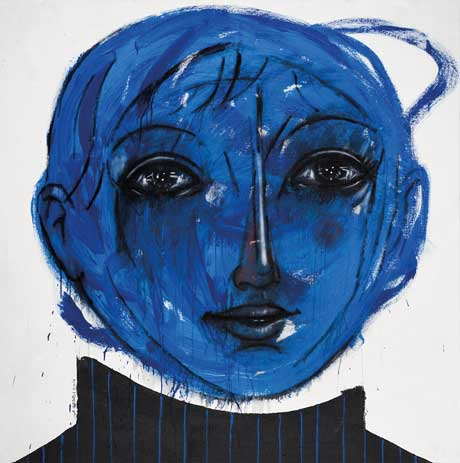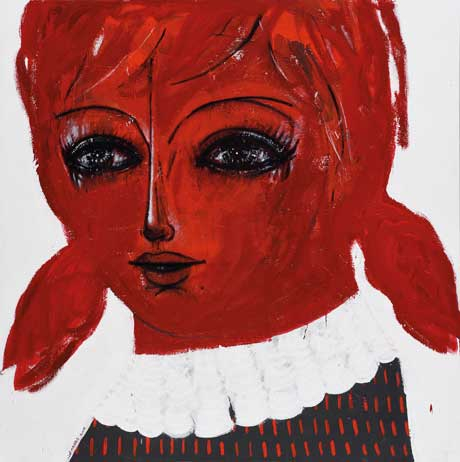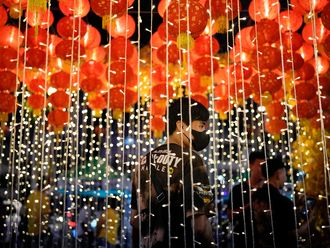Early in his career, Syrian artist Mohannad Orabi painted vivacious childlike figures that expressed the wonder and whimsy of the formative years. But after the conflict in his country forced him to move to Cairo, and then to Dubai, his naïve figures became more realistic and grown up, as they witnessed the turmoil in the region. In recent times, he has referenced media images of the devastation in his country, posters of martyrs, profile pictures on social media, and old family portraits, to depict the anguish of Syrians who have been displaced from their homes.
But Orabi’s latest exhibition, Ripples, offers a counter image to the death, destruction and displacement in his country, and conveys a message of hope for the future. His new body of work is inspired by his life in Dubai, and his new environment. His palette is brighter, and the smiles are back on the faces of the doe-eyed children in his portraits.
In some paintings he has used sand collected from various places in the UAE, as well as the colours of the sea and sun, to highlight his growing connection with the place he now calls home. The artist has also experimented with new media and materials to create iron sculptures that emphasise the contours of his figures, and feature circular forms patterned after ripples.
“When you throw a stone in still water, it creates ripples that disturb the water, and then gradually fade away. This is a good metaphor for how destiny plays with us and our plans. I had never thought of leaving my country, but things that were not in my control created ripples in my life. Now, I am trying to let the bad memories fade away, keep the good ones, and live in the present without worrying about the future,” Orabi says.
A big reason for the change in his mood and outlook is his infant daughter. Orabi acknowledges that his bright palette, use of glitter, and cute, feminine figures are all influenced by her playfulness, laughter and love for colourful clothes, bows and ribbons.
“Today, the most important thing for me is to give my child a happy and secure life. I am concerned about my daughter and an entire generation of Syrian children who are growing up amidst this conflict. But the children in my paintings look calm and they are smiling, with their heads raised up, eyes open and filled with hope, because I believe in their future. We all have a responsibility to give them a good education, and teach them to respect others, so that their lives are never marred by conflicts,” he says.
Another positive symbol is the return of the sparrows that once populated Orabi’s paintings, but were missing from his recent work. They are seen flocking around the children, evoking the idea of a borderless world where children are free to flourish.
“Traditionally birds are messengers of good news. To me they signify good energy, and perhaps what brings them back is the fact that the children are now happy and at peace,” Orabi says.
The sand he has used in several paintings imparts different colours and textures to his compositions. But there is a deeper meaning and significance behind his use of this material.
“Sand is an important element of the UAE’s landscape, and represents the people I have met, and the new friends I have made here. I collected sand of different colours and textures from the different emirates, and these paintings are a reminder of my presence here, and my relationship with this place. But the layer of sand in my paintings also represents the layer of new memories that has covered my old memories of Damascus. Each painting has multiple layers inspired by my memories and experiences in Syria, Egypt and the UAE, and I ensure that every layer is visible in the final work because I respect all my memories, whether old or new, good or bad,” Orabi says.
Ripples will run at Ayyam Gallery, Alserkal Avenue until October 26.














